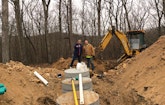Interested in Education/Training?
Get Education/Training articles, news and videos right in your inbox! Sign up now.
Education/Training + Get AlertsIread a story from a small Missouri newspaper recently that illustrated just how uneducated homeowners can be about septic system maintenance. And it gave me a big idea.
The writer in the Boone County Connection, Lelslie Limberg, was explaining how a power outage forced her to get her septic tank pumped for the first time after 16 years of home ownership. Later, when she found out she should have her tank pumped regularly, her response was succinct: “Oops.”
Limberg learned her aerator was nonfunctioning and “to make matters worse, the filter was jammed (Filters need regular cleaning, right?) Gross. Who knew? No one said anything about this when we bought the house.
“Is everybody else up on their septic tanks?”
You know the answer to that question: No way. Wish they were.
This is just another random story showing the dire need for consumer education about the need for regular pumping and septic system maintenance in general.
THE WASTEWATER GURU
The writer turned to her county’s “formidable, all-knowing wastewater guru,” Sandy May. For 25 years, May has served as wastewater system inspection specialist for St. Charles County, Missouri, where she oversees 7,000 onsite systems. May quickly shared a list of 12 tips to avoid septic system failure, including “pump your tank every two to three years and every year if you have an alternative-type system.”
Problem solved.
This is where my idea comes in. We as the industry should give an award every year to a strong advocate for better public education about septic system care. We need to recognize those hardworking folks who act as a conduit between the uninformed homeowner and the professional pumper; the people who recognize when a consumer is lacking the basic knowledge about their septic system and sets them on the right path.
And I would nominate Sandy May as the first honoree.
I can’t imagine how many homeowners May has helped in her inspection career. And every time she educates a homeowner, a system designer, an engineer or a Realtor, she’s helping the pumpers in her region. May recognizes that the pumpers often bear the brunt of the criticism when they’re called out to address a neglected system.
“They wait until it breaks and then they start pointing fingers at everybody, and everybody is at fault but them. It’s amazing,” May says of homeowners, especially those who are living in their first home with an onsite system. “Then you ask if they knew three toilets in their house were running for 30 days.”
SPREADING THE WORD
When she started working in the Division of Building Code Enforcement, May quickly noticed an education gap among septic system users, Realtors, and even the professional engineers who were designing systems.
She meets with people having systems installed at new homes and finds out if they’ve ever lived off the public sewer grid. She patiently explains how their water-use habits will have to change moving off the sewer. She gives them the checklist and suggests they follow all of the recommendations.
“Once you get a feel for (who’s used a septic system before) you know which ones you have to work with … then I go to town,” she says. She sends them the tips list, a soil report to keep on file, and provides lists of licensed installers and pumpers when that’s requested.
As someone who can design systems in suitable soils and has learned the lay of the land in her part of Missouri, she focuses on working closely with engineers on all of the practical issues learned over the years working with installers and pumpers on the front line of maintenance. May’s father and son are both engineers and she respects the profession, but she also says it’s unfortunate there is no statewide training about onsite work for engineers.
“A lot of times they’re not going to the site,” she says in regard to a burgeoning business in new systems of late. “They draw stuff so pretty, it looks so nice on paper. Then when they get out there it’s different. The ground doesn’t lay like they show it on the plan. They’re designing at their desk. If they’d have gone out there, they’d see that.”
And Realtors get special attention as well. May organizes septic seminars for real estate agents 10-15 times per year, attended by 20 to 80 people each. She says 90 percent of the Realtors are concerned about the septic systems, while “others don’t care. They’re just going to sell.” While her county code doesn’t mandate pumping or real estate inspections, she’s always pushing to improve oversight.
“I’d like to get into the real estate agents’ pockets, and then they’d decide real estate inspections are a good idea,” she concludes.
GLIMMER OF HOPE
There’s good and bad when you’re pushing education, May says.
“The idea is to get people interested and involved in maintaining their systems,” May says. “I think we don’t do enough training. I try to call on homeowners, discuss systems on the front end and explain as much as I can. But people, once they flush, it goes bye-bye and they don’t care.”
Well, that’s not entirely true, May admits. She had a recent experience that gives her hope.
May remembers giving her pitch to a woman building a new home in the early 1990s shortly after she started working for the county. She caught up with the homeowner recently as she was selling the same house. There were no problems with her onsite system after all the years.
“She did everything I told her, and when it came time to sell that house, it passed a septic inspection, didn’t need the tank pumped, the aerator replaced or the filter cleaned. She told me, ‘Since I did everything you told me to do, I’ve never had a problem with the system.’”
Another homeowner recently called May out to thank her for being a straight shooter and an honest evaluator. “He told me, ‘You’re not the good old boy trying to get into someone’s pocket. You’re out to help me.’ After all these years, that made me feel pretty good.”
DOING GOOD WORK
Quietly going about her business, May is making a difference for the pumpers in her county. Homeowner by homeowner, she’s working to prevent premature system failure and show the value of calling a pumping professional for routine service. Without her efforts, there would be more blame thrown to wastewater contractors and doubts about the effectiveness of decentralized wastewater in general. For that we owe her and others like her a debt of gratitude.
So what should the wastewater educator’s award be? How about a plaque with a golden vacuum truck?








